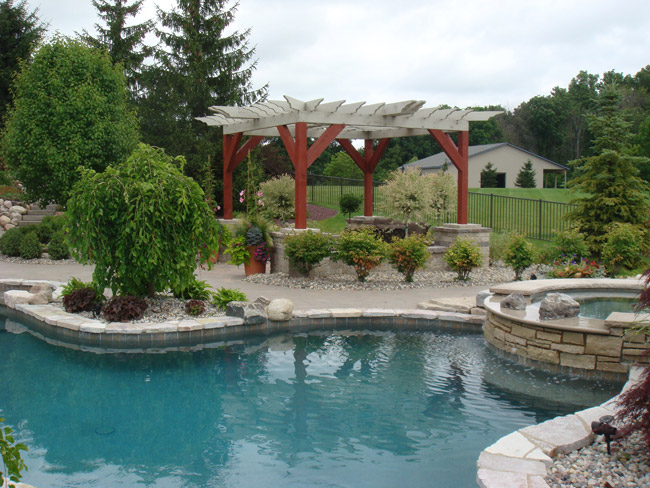Inground pools are a luxurious addition to any property, offering a refreshing oasis for relaxation, recreation, and entertainment. However, choosing the right type of inground pool can be a daunting task, given the wide range of options available. From traditional concrete pools to modern fiberglass and vinyl-lined pools, each type offers unique features, benefits, and considerations. Let’s explore the different types of inground pools to help you make an informed decision for your backyard paradise:
1. Concrete (Gunite or Shotcrete) Pools: Concrete pools, also known as gunite or shotcrete pools, are a popular choice for homeowners seeking customization and durability. Constructed by spraying a mixture of concrete and sand onto a steel framework, concrete pools can be shaped and sized according to your specifications. They offer endless design possibilities, including custom shapes, water features, and integrated spa areas. However, concrete pools typically require longer construction timelines and higher upfront costs compared to other types of inground pools. Additionally, they may require periodic resurfacing and maintenance to keep them looking their best.
2. Fiberglass Pools: Fiberglass pools are prefabricated shells made from fiberglass-reinforced plastic. They are manufactured in a controlled factory environment and delivered to the installation site as a single piece. Fiberglass pools are known for their quick installation process, typically taking only a few days to complete. They come in a variety of shapes and sizes, ranging from classic rectangles to kidney-shaped and freeform designs. Fiberglass pools offer smooth, non-porous surfaces that are resistant to algae growth and easy to maintain. However, they may have limited design options compared to concrete pools, and transportation restrictions may limit access to certain installation sites.
3. Vinyl-Lined Pools: Vinyl-lined pools are constructed with a steel or polymer frame and lined with a vinyl membrane. They are a cost-effective option for homeowners on a budget, offering a lower upfront cost compared to concrete or fiberglass pools. Vinyl-lined pools come in a wide range of shapes, sizes, and patterns, allowing for customization to suit your preferences. They offer a smooth, non-abrasive surface that is comfortable to the touch and resistant to algae growth. However, vinyl liners may need to be replaced every 7 to 10 years, adding to long-term maintenance costs. Additionally, vinyl-lined pools may be more susceptible to punctures and tears compared to other types of inground pools.
4. Natural (Pond or Lagoon) Pools: Natural pools, also known as pond or lagoon pools, are designed to mimic the look and feel of natural bodies of water. They feature a combination of plants, rocks, and filtration systems to create a self-sustaining ecosystem. Natural pools offer a more organic and environmentally friendly alternative to traditional inground pools, with water quality maintained through natural filtration methods. They provide a serene and tranquil swimming experience, with water temperatures regulated by natural processes. However, natural pools may require more maintenance and upkeep compared to conventional inground pools, as they rely on balancing the ecosystem to prevent algae growth and maintain water clarity.
5. Saltwater Pools: Saltwater pools have gained popularity in recent years as an alternative to traditional chlorine pools. These pools use a salt chlorination system to produce chlorine from dissolved salt, eliminating the need for harsh chemical additives. Saltwater pools offer softer, gentler water that is more comfortable for swimming and less irritating to the skin and eyes. They also require less frequent maintenance and chemical balancing compared to chlorine pools. However, saltwater pools may corrode metal fixtures and equipment over time, requiring periodic maintenance and replacement.
In conclusion, choosing the right type of inground pool for your property depends on various factors, including budget, design preferences, maintenance requirements, and environmental considerations. Whether you opt for a customizable concrete pool, a quick and easy fiberglass installation, a budget-friendly vinyl-lined pool, a natural pond-inspired oasis, or a gentle saltwater swimming experience, there’s a perfect inground pool option to suit your needs and lifestyle. By carefully weighing the pros and cons of each type of pool and consulting with a reputable pool contractor, you can create the backyard oasis of your dreams for years of enjoyment and relaxation.


Recent Comments